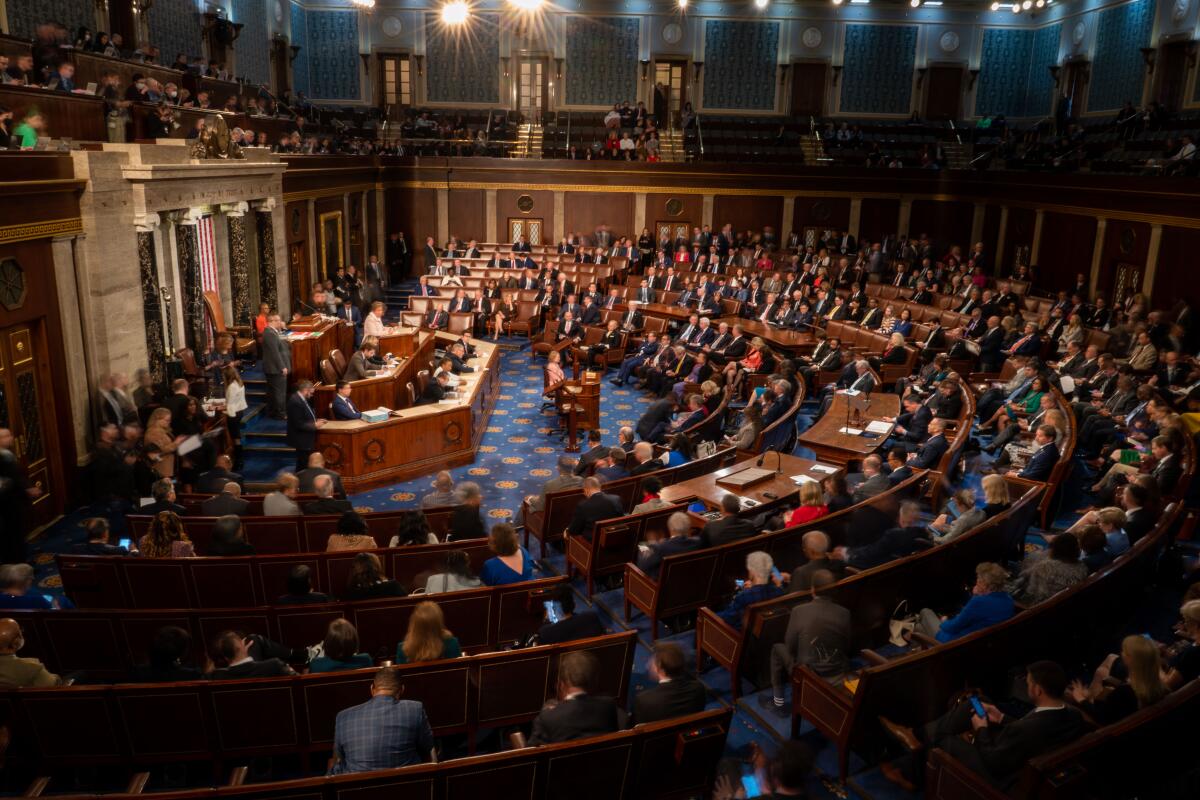With Senate primary over, political energy turns to California House races

- Share via
Technically, Tuesday’s primary election pushes California’s race for the Senate seat held by the late Dianne Feinstein into its final round, with the general election coming up in November.
In reality, the race is pretty much over.
There’s little reason to think that Republican former baseball star Steve Garvey can mount a serious challenge to Democratic Rep. Adam B. Schiff in this once-in-a-generation race. Garvey raised just $2.1 million to Schiff’s $31.4 million as of Feb. 14, and Republicans haven’t won a statewide race in California since Arnold Schwarzenegger was reelected in 2006. The share of registered Republicans has dropped since then, and Democrats now outnumber GOP voters two to one.
But while the next phase of the Senate race is shaping up as a bit of a snoozer, House races in California are poised to provide a slew of excitement. The Golden State is home to several of the country’s most competitive House contests, and with Republicans holding a slim three-seat majority, California will play an unusually large role in determining control of Congress. For the next several months, political attention — and dollars — will be trained on House races in Orange County, the Central Valley and the Palm Springs area. Buckle up.
I’m Laurel Rosenhall, The Times’ Sacramento bureau chief, here with the highlights from a big week in California politics.
Prop. 1 teeters on the verge
Gov. Gavin Newsom’s top priority on this week’s ballot is shaping up as a real nail-biter.
Proposition 1, a statewide bond measure to build new mental health treatment facilities that Newsom pitched as necessary for getting the sickest people off the streets, remains too close to call. It has support from just 50.3% of the votes counted as of Thursday morning.
The proposal enjoyed unusual bipartisan support when the Legislature put it on the ballot in September. But among the electorate it’s faced opposition from the left and the right, with liberals arguing that the approach could infringe on civil liberties and conservatives arguing against the costs involved in borrowing $6.4 billion.
There’s also the Newsom factor. The governor headed into the Proposition 1 campaign with approval ratings late last year at an all-time low. Prop. 1 was key to his plan to tackle homelessness, and he made himself the central pitchman in advertising it to voters.
Newsom is a politician unaccustomed to losing. Since his days on the San Francisco Board of Supervisors, he hasn’t lost a single race as he climbed the ranks to the state’s highest office. (He pulled out of the 2010 governor’s race against Jerry Brown and opted instead for the less competitive race for the lieutenant governor’s office.) He was the proponent for statewide ballot measures on gun control and marijuana legalization that voters approved overwhelmingly. He handily defeated an attempted recall in 2021.
A defeat on Prop. 1 would not only be a stunning rebuke of Newsom in the sunset of his governorship, it would also weaken his ability to visibly improve the conditions on California’s streets. That’s a challenging legacy to contend with in any possible future run for higher office.
L.A. races to watch
Two embattled Los Angeles incumbents lived to fight another day.
City Councilmember Kevin de Leon and Dist. Atty. George Gascón were in first place in their respective races, propelling them to a November runoff. De Leon appears likely to face Democratic Assemblyman Miguel Santiago in the race for L.A.’s 14th council district and Gascón is likely to face Nathan Hochman in the contest for L.A. County’s top prosecutor.
Both incumbents have caused ire during their terms and face serious challenges to reelection.
Kevin de Leon was “written off as political dead meat nearly 18 months ago, when a secretly recorded conversation was released that featured him and three other L.A. political bigwigs engaging in bigoted, conspiratorial rants,” writes Times columnist Gustavo Arellano.
But Kevin de Leon is a fighter who has overcome many obstacles in life and in politics. He’s survived recall attempts, calls for his resignation, failed runs for Senate and the mayor’s office. Earlier in his career, while a lawmaker in Sacramento, De Leon bounced back from a failure to win the Assembly speakership by winning the trust of his Senate colleagues to become the leader of the state Senate. I am eager to see how he navigates the race with Santiago and this next phase of his political career.
Gascón took office four years ago touting a progressive criminal justice reform platform that was popular in the wake of George Floyd’s murder in 2020, write Times reporters James Queally and Sonja Sharp. But in this election, he’s found himself facing a different political landscape with many voters concerned about crime. Multiple polls showed him with a disapproval rating of more than 50%, and frustrations with his policies and his perceived weakness led 11 candidates to challenge him.
The one who rose to the top, Hochman, is a former federal prosecutor who ran for attorney general as a Republican in 2022. He is now running as an independent and has dismissed any notion of partisanship in the D.A.’s race.
It promises to be another lively contest.
Enjoying this newsletter? Consider subscribing to the Los Angeles Times
Your support helps us deliver the news that matters most. Become a subscriber.
Keeping up with California politics
News analysis: How Trump propelled Schiff to the general election — and likely a Senate seat
For all of California’s ills and hardships, nothing animated the state’s left-leaning electorate in this year’s Senate race more than the specter of former President Trump returning to the White House. The omnipresence of Trump’s legal travails and his dominance in the Republican presidential primary ensure his shadow over the 2024 election will remain through November, and only increase Rep. Adam B. Schiff ‘s already heady chances of becoming California’s newest U.S. senator.
Schiff cheapened himself with his cynical effort to help Garvey in Senate primary
Rep. Adam B. Schiff’s clever and cynical ploy in California’s Senate primary enabled him to avoid risk in the November runoff. But he subjected himself to another risk, writes columnist George Skelton. The Burbank Democrat may have dug some potholes in the high road he normally travels.
A land of flaming liberalism? Senate results contradict California stereotype
The voters spoke Tuesday in the state’s marquee election and what they said was: We’ll stick with what we know, writes columnist Mark Z. Barabak. By choosing Schiff, a Burbank congressman who was the most moderate of the major Democratic candidates — and thus most Feinstein-like — they rejected the leftward swerve promised by two more liberal alternatives, Reps. Katie Porter of Irvine and Barbara Lee of Oakland.
Here’s what results in key California House races look like so far
With Republicans holding a razor-thin three-seat majority and California home to several swing seats, control of Congress in 2025 could very well be decided by voters in Golden State suburbs. Here’s how some key swing seats are shaping up so far.
Laura Friedman takes early lead in race for Schiff’s former House seat
Assemblymember Laura Friedman (D-Glendale) has a decisive lead in the race to replace outgoing Rep. Adam B. Schiff in a coveted Los Angeles-area House seat. Republican intensive care physician Alex Balekian is in second place, giving Friedman a strong shot at landing in Congress given the Democratic tilt of the district.
Stay in touch
Did someone forward you this? Sign up here to get California Politics in your inbox.
Until next time, send your comments, suggestions and news tips to capolitics@latimes.com.
Sign up for Essential California
The most important California stories and recommendations in your inbox every morning.
You may occasionally receive promotional content from the Los Angeles Times.







